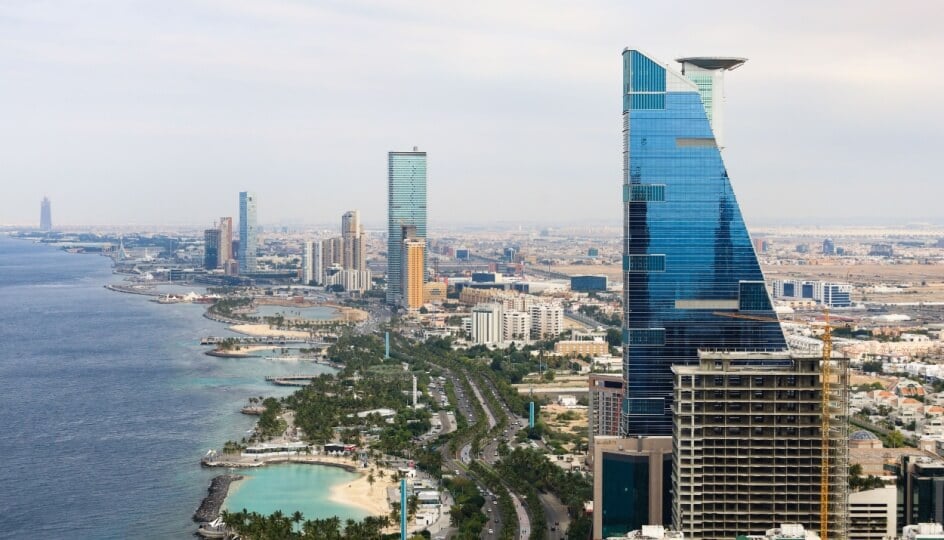Key considerations for incorporating in Saudi Arabia

With its pro-business environment and strategic location, Saudi Arabia is fast becoming a global hub for company expansion. Tax incentives and streamlined incorporation procedures have enhanced its investor appeal, while its Vision 2030 initiatives are paving the way for economic diversification and long-term growth. The country’s new Regional Headquarters programme offers multinationals a strong foothold in the MENA region with access to a rapidly growing market, brimming with opportunity.
As one of the world’s major oil producers, the Kingdom of Saudi Arabia is the largest economy in the Middle East. The country covers about 80% of the Arabian Peninsula and is divided into 13 provinces, with Riyadh as its capital. Saudi Arabia holds about 21.5% of the word’s petroleum reserves, making it the largest exporter of petroleum and a key player in the Organisation of Petroleum Exporting Countries (OPEC).
In 2016, Saudi Arabia launched the transformative Vision 2030 plan to diversify its economy and attract foreign investment. The plan is built on three core pillars: a vibrant society, a thriving economy and an ambitious nation, which together will unlock a new era of sustainable growth. From an economic perspective, the country aims to reduce its reliance on oil revenue by expanding into other business sectors, such as technology, tourism and renewable energy. The economic reforms that underpin Vision 2030 are designed to increase competitiveness and profitability, while offering a plethora of business opportunities to foreign investors looking to expand into the Middle East.
With options for 100% foreign ownership, simplified licencing and specialised programmes such as the Regional Headquarters (RHQ) initiative, the Kingdom is rapidly emerging as a premier destination for business expansion. This guide outlines the key considerations, steps and opportunities for incorporating in Saudi Arabia, helping investors make informed decisions and tap into the region’s dynamic growth.
Unlocking opportunity: key considerations for incorporating in Saudi Arabia
Ongoing regulatory reforms and incentives have made it easier to incorporate a foreign-owned entity in Saudi Arabia. However, companies need to ensure that they fully understand the complexities of the regulatory environment before incorporating.
Here are some key considerations to guide your incorporation journey:
Business entities: There are a number of entity options in Saudi Arabia, the most common being limited liability companies (LLCs), joint stock companies (JSCs) and branch offices.
Saudi law also recognises general partnerships, limited partnerships and unincorporated joint ventures. These are less common for foreign investors due to unlimited liability in general partnerships and other complexities. However, joint venture arrangements are frequently used via contract or through an LLC/JSC where a foreign company partners with a local firm for specific projects (particularly in restricted industries).
It’s advisable to evaluate factors such as the number of investors, the nature of your business activity and growth plans when choosing the vehicle. In many cases, forming an LLC is the simplest option for foreign companies entering Saudi Arabia, unless a specific scenario warrants a JSC or branch.
Incorporation procedure: As part of its Vision 2030 programme, Saudi Arabia is actively encouraging foreign investors to establish LLCs – 100% foreign ownership is now permitted in a number of sectors. Foreign investors will mostly engage with MISA (Ministry of Investment for Saudi Arabia), which serves as a one-stop investment licencing authority, and the Ministry of Commerce for commercial registration.
To incorporate an LLC in Saudi Arabia, you’ll need to:
- Choose a company name and obtain initial approval: ensure the proposed name meets Saudi naming rules (no religious or royal names, etc.), and is not already in use. You can check name availability through the Ministry of Commerce’s online portal. Once you select a unique name, you’ll need to reserve it and secure initial approval for incorporation.
- Obtain a licence from MISA: foreign investors must obtain a MISA licence to establish and operate a business in Saudi Arabia. Licences are tailored to specific business activities and each one has its own requirements and benefits.
Licence options include:
- Commercial licence – for trading activities (eg buying/selling goods, retail or e-commerce)
- Service licence – for providing services such as IT, consulting, finance, engineering and so on
- Industrial licence – for manufacturing or industrial operations (often requires meeting certain facility and Saudi content criteria)
- Entrepreneurial licence – geared towards startups and innovative small businesses
- Other specialised licences – for sectors such as mining, agriculture, real estate, or professional services
Each licence type has specific documentation requirements and criteria. Once the MISA licence has been granted, you can formally register the company.
- Prepare and submit the required legal documentation translated into Arabic: draft the Articles of Association (for an LLC) or by-laws (for a JSC) in line with Saudi regulations. These must be in Arabic (or bilingual with Arabic prevailing). Other documents include a formal shareholder resolution to establish the Saudi entity, identification documents for shareholders and managers, and, if applicable, the parent company’s certificate of incorporation. Documents from abroad must be certified by the Saudi embassy in the relevant home country once they’ve been notarised.
- Register with the relevant authorities and obtain the necessary certificates: after obtaining the company registration, the company must register with the Zakat, Tax and Customs Authority (ZATCA) for tax identification (and VAT, if applicable), and with the General Organization for Social Insurance (GOSI) for employee social insurance registration. Depending on the business, additional approvals might be required, for example, industrial companies need environmental permits; pharmaceutical or food businesses need SFDA approvals, etc.; and companies in Special Economic Zones might register with the Economic Cities and Special Zones Authority (ECZA).
- Set up a corporate bank account and deposit capital (if required): finally, the company should open a bank account in Saudi Arabia to facilitate operations. Many local and international banks operate in KSA. The bank will require copies of the company registration, MISA licence, company documents and identification for the authorised signatories. If the licence or regulations stipulate a minimum capital, the company may need to deposit this amount. However, for most LLCs today there is no fixed minimum capital (aside from certain sectors), though in practice companies often inject sufficient working capital to initiate operations.
Tax overview: Saudi Arabia offers investors a tax-friendly environment with no personal income tax and no standard tax year. A flat rate of 20% corporate income tax is applied to non-Saudi entities or permanent establishments. A standard rate of 15% VAT is levied on most goods and services. ZATCA is the official tax authority and is responsible for the collection of all taxes and customs in Saudi Arabia. Additionally, withholding tax applies to payments made to non-residents, and businesses operating in Special Economic Zones may benefit from further tax incentives.
Establishing an RHQ: a strategic opportunity for multinationals
The Saudi government launched the Regional Headquarters (RHQ) programme in 2021 with the aim of transforming the country into a global business hub. The programme incentivises multinationals to set up their Middle East and North Africa (MENA) headquarters in the Kingdom, thereby gaining strategic advantage in a rapidly growing market.
Unlike standard MISA licences, RHQ licences prohibit commercial operations and are intended for regional management and support functions such as marketing, finance and HR. While non-RHQ companies are subject to regular taxes and Saudisation rules (ie businesses are required to meet specific Saudi employee quotas), an RHQ licence offers generous fiscal incentives and an exemption from Saudisation requirements for 10 years.
Saudi Arabia’s RHQ programme is designed to be a growth accelerator, and, as such, offers multinationals a host of additional benefits including:
- Preferential access to government contracts
- 0% corporate income tax on qualified income and 0% withholding tax for 30 years
- Exemption from the visa limit cap to facilitate international recruitment
- Access to Miza, a government platform designed to streamline and support business operations
The RHQ programme is gaining momentum in Saudi Arabia, with over 125 new RHQs established in the first quarter of 2024 alone. The RHQ model has also proved successful in other countries, including Singapore, China, India and Brazil, where it has helped boost economic growth and spur foreign investment.
Obtaining an RHQ licence
To secure an RHQ licence, multinationals must have a presence in at least two MENA countries (excluding Saudi Arabia and the company’s headquarters). They must operate in the MENA region and engage in strategic, management or support function activities through their branches, subsidiaries or affiliates in the MENA region.
Here's an overview of the RHQ application process:
- Submit an application with supporting documentation to MISA including certificate of incorporation, business plans, commercial registrations, audited financial statements and employee data
- MISA will review the application to ensure the business meets the relevant criteria
- Once the application has been approved, the RHQ licence will be issued
- The RHQ entity must then be registered as either a branch office or LLC
- Operations must begin within six months of the licence being issued
- Businesses will need to comply with ongoing regulations and requirements
The RHQ initiative goes beyond regulatory compliance – it’s a long-term investment in business growth. Companies that act now can leverage RHQs to strengthen regional influence, tap into new markets and gain competitive advantage, while contributing to the success of Saudi Arabia’s Vision 2030 strategy.
Talk to us
Our TMF Saudi Arabia team offers a range of critical compliance and administrative services, tailored to your business’s unique needs.
Whether you’re looking to establish a business in Saudi Arabia, or set up an RHQ, we’ll help you navigate incorporation complexities and build a strong, sustainable presence in the region.
To learn more about how we can help you unlock opportunities for growth, contact us today.




